A Bit of Bad Writing Is Helpful
Writing Workshop Notes
Above graphic from here.
I’m recently back from Cincinnati. At the Taft Center, I conducted a writing workshop in the morning and then, later in the day, delivered a keynote talk about assembling a book. This was a completely different encounter than a simple campus visit because, thanks largely to Stephanie Sadre-Orafai, there had been a series of workshops prior to my visit tied to a few of my books: a writing workshop on walking, another on how to slow-jam the news, and yet another on journaling. Stephanie also made me a cute notebook using a flyer for my talk. Which is all to say, I’m offering gratitude.
What I want to now discuss is the subject of writing prompts that I used during my workshop in Cincinnati. For the opening exercise I wanted everyone to write plain instructions for making a cup of tea or coffee. Then, a couple of minutes after writing those instructions, I wanted the sentences to take wing and do something more than simply put down rules. (Even Orwell, despite his transparent sentences, conveys an attitude.) Here are two samples that were written in the workshop. The first is by Felicia Zamora and the second by Chandra Frank—theirs was a quality of writing that clarified my role there, not as a teacher but as an agent who was simply (and literally) prompting people to produce words:
Consider the warmth. At the mirror, before contacts, before brushed teeth, a dull sore at the back of your throat. A week ago, heaving & sour spills from your chest. Consider the warmth, now, at your lips—minutes before, earthly aroma, grinding beans as sparrow’s dawn cackle. Anticipation of sooth. Consider the warmth—what rituals you will make for yourself—cultivation—possibilities spun inside possibilities—& the sparrow, too, beds down the nest, desireful.
Dwell in the dark a little before making your first early morning coffee. Light a candle for dramatic effect. Avoid overhead lights. Amber incense is also recommended. Then, the Moka pot. Adding a crushed cardamom pod is crucial. Though it will upset purists in Moka subreddits. Be respectful with the Moka pot, otherwise. For top/bottom synchronicity: filtered water, espresso beans, grind or grounds. You stay close for the scent, sounds matter too. This is process. Gurgling is not the measure I want to give you. I’m drawn to the sounds of spillage, flow, even bubbling (please share yours). I do local goat milk, warmed in a saucepan. You need a small ceramic cup. Pour coffee first, then add just enough milk. Sit with it, refill.
We moved on to the next exercise. The workshop participants first read paragraphs about the weather, actually the first paragraphs in the books by three writers (see below) and then they were to write about a Fall day. What does it make you remember. That is straight-forward. But then comes the twist in the prompt: Maybe write about what you don’t remember. This prompt came from a writing workshop I had attended the previous week. My old friend Cheryl Strayed was teaching her annual 3-day workshop at nearby Omega Institute and the institute’s Elizabeth Lesser kindly sent me a comp ticket and I went. It was a fantastic event charged with a collaborative, creative energy.
During her workshop, when Cheryl asked us to ‘write about what you don’t remember,’ I began writing in that large hall surrounded by strangers. The first line I wrote down: ‘I’m thinking now back to the time when I met Cheryl.’ Cheryl was only twenty-two then. Her mother had died recently. This was in the Twin Cities. I’m five years older than Cheryl and I was a graduate student at that time; Cheryl and I formed a writing group with another friend whose last name is escaping me now. But that is not what I was remembering that morning at Omega. A memory had come up, unbidden, about another woman in Minnesota whom I knew at that time and not very well at all. I wrote some lines about that woman from some decades ago. Just as Cheryl was announcing from the podium that time was up, I remembered a card I had received from her. It showed a man seated at a table in a cafe with a cup of coffee in front of him. And there was a caption that was in fact a short-short story. I had put that card from Cheryl with its funny, mocking caption in my novel Immigrant, Montana:
My next exercise in Cincinnati was a detour through Joan Didion, William Maxwell, and Denis Johnson. And then, before we ended, I wanted everyone to do some bad writing. At random, I had chosen a line from Geoff Dyer’s Zona where he quotes Albert Camus. I like doing the bad writing exercise. You take a perfectly good line and make it bad. I think it teaches us what makes a piece of writing good.
In response to this prompt, Alexandra Dantzer, a post-doc fellow at the Taft Center, capturing some of the spirit of grad school academicspeak crafted this piece of bad writing: ‘Albert Camus believed that a mans’ work is a torturous finding. What is to be found is the scene, an encounter with an object of desire in a Lacanian sense, an object petit. The object being an image whose punctum in the Barthian sense creates an affective atmosphere....’ Chandra, whom I have quoted above, showed herself adept at also doing bad writing: ‘Camus believed that heart openers are found in vast journeys but make it art-like.’ (A couple more arrived after I had posted the Substack. Here’s one from Stephanie Sadre-Orafai: ‘Albert Camus believed that you gotta kiss a lot of frogs to remember what a real prince tastes like.’ And here’s another from Joyce Miller: ‘Albert Camus believed that his whole life’s work was influenced by the need to find inspiration in the few things he first thought were cool and made him think about things a lot.’ Thank you for playing, friends!)
Do you, dear Substack reader, need a prompt for writing? Write a three-hundred word piece whose opening or closing line is: ‘There was no going back.’


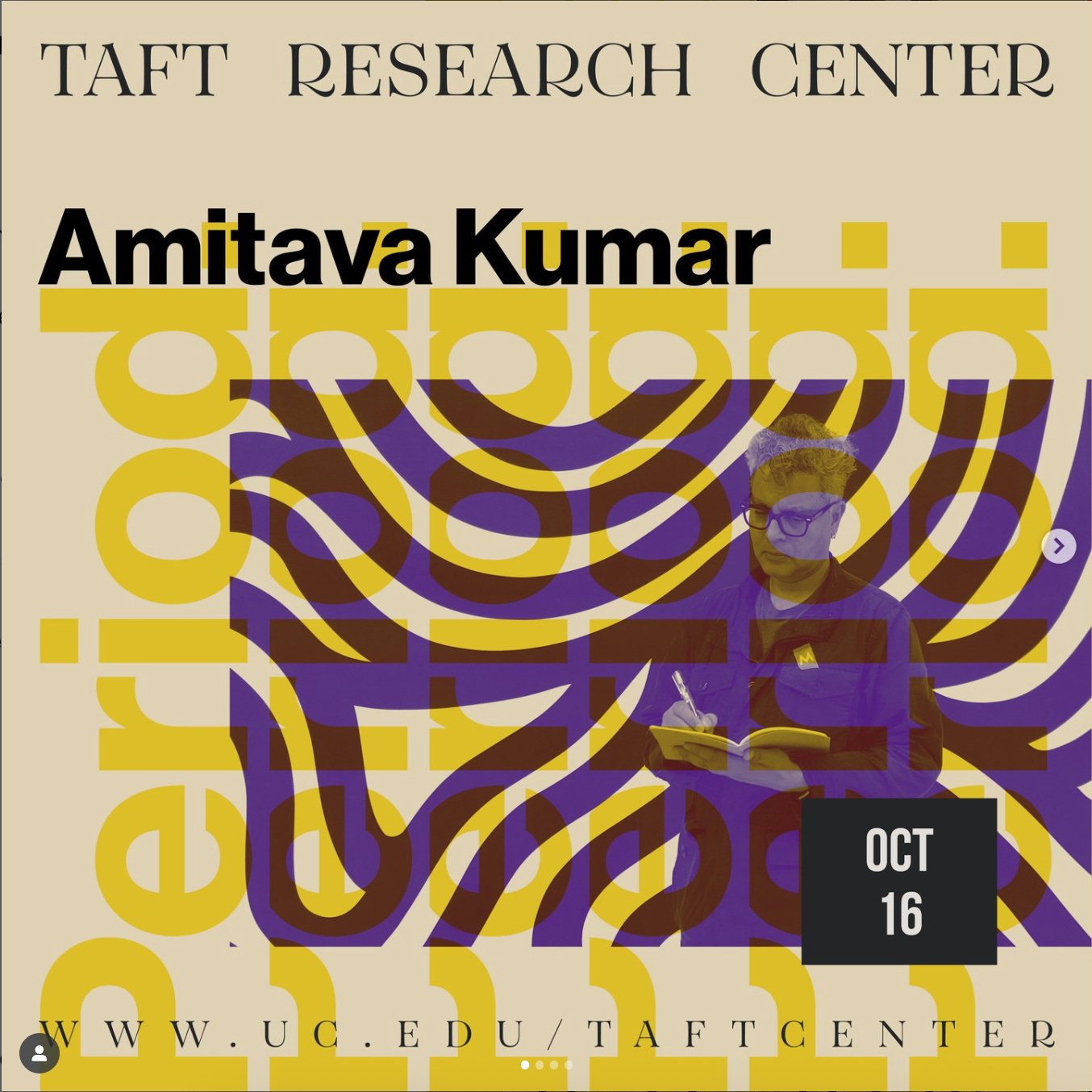
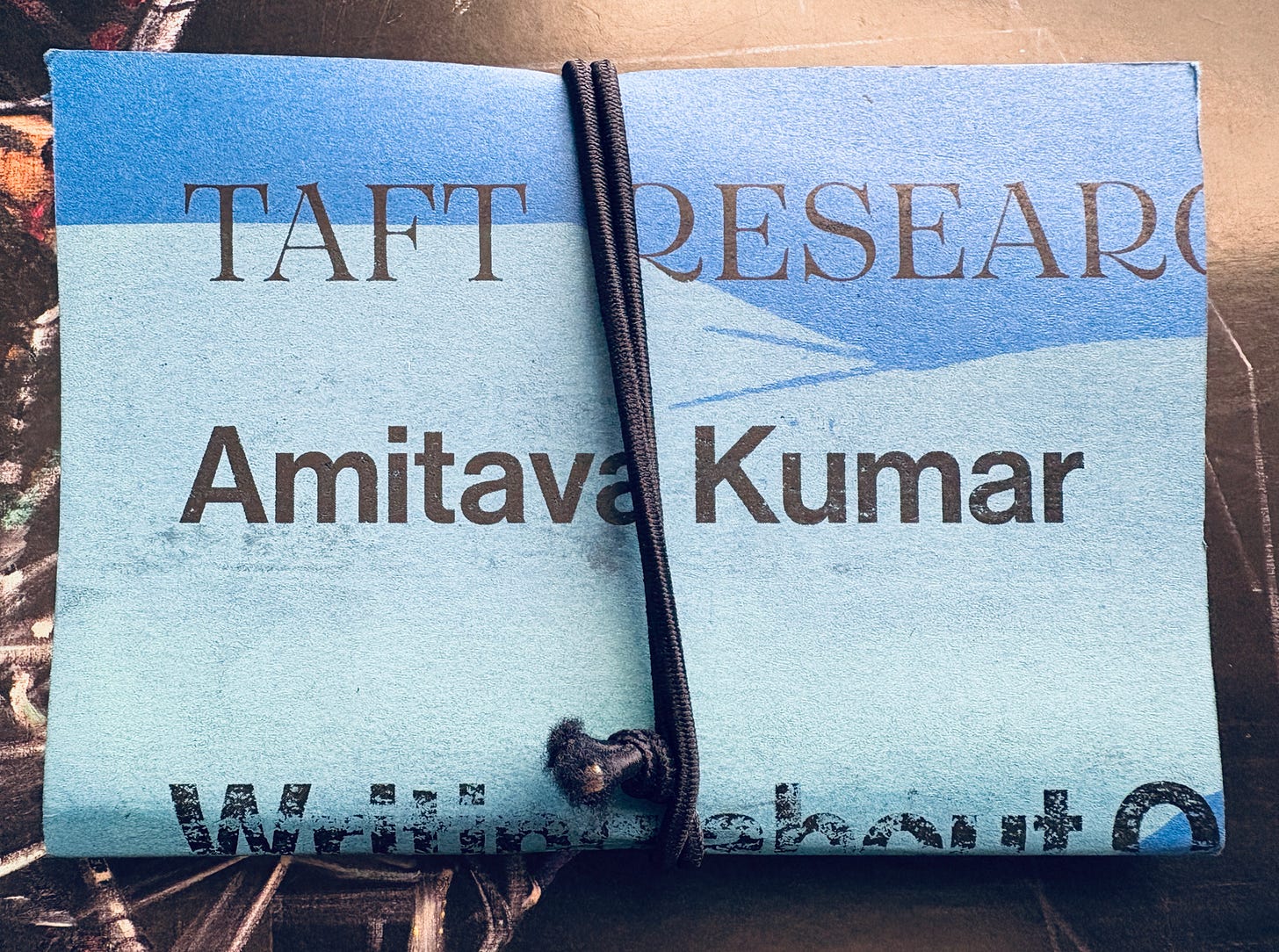
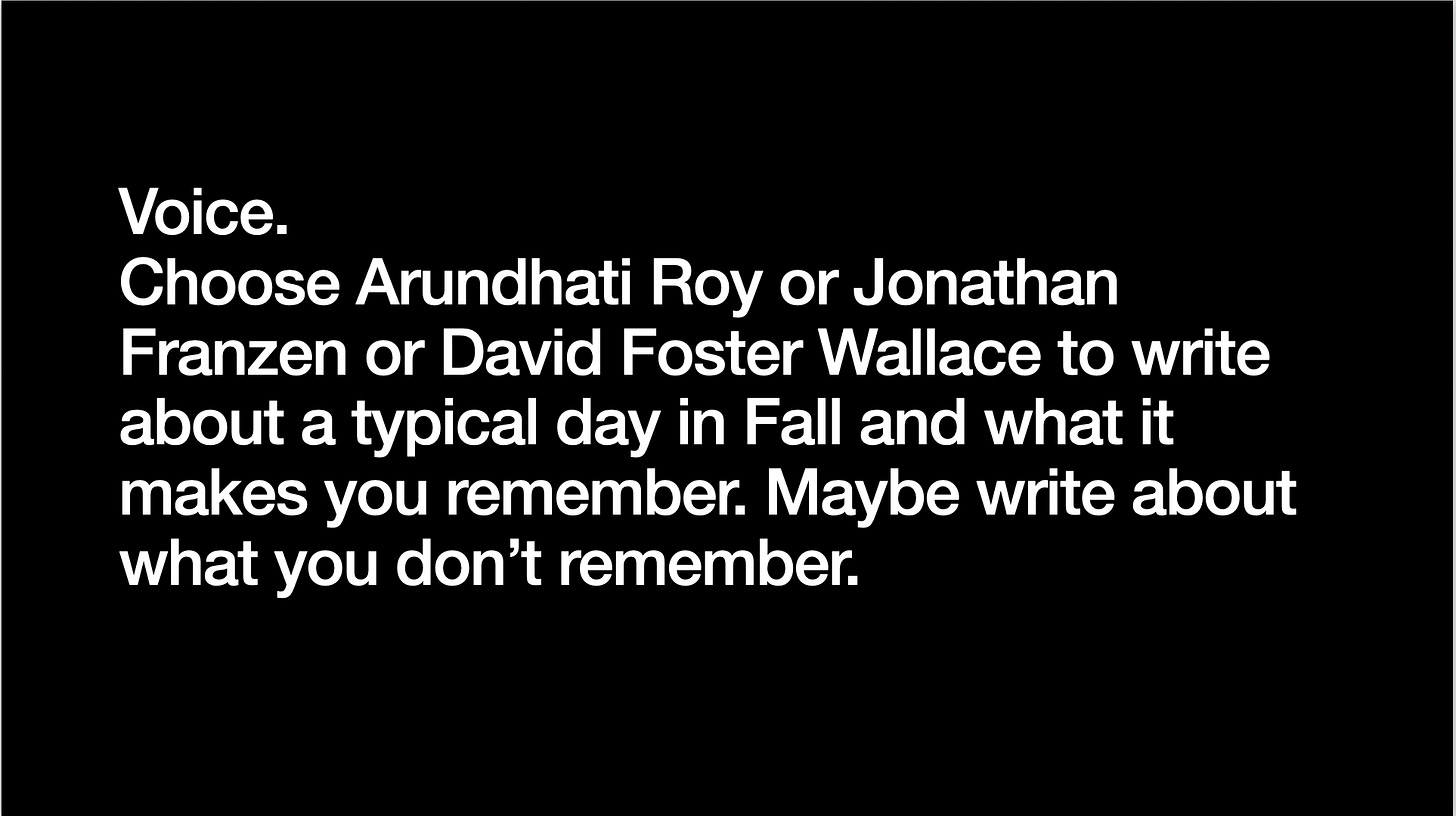
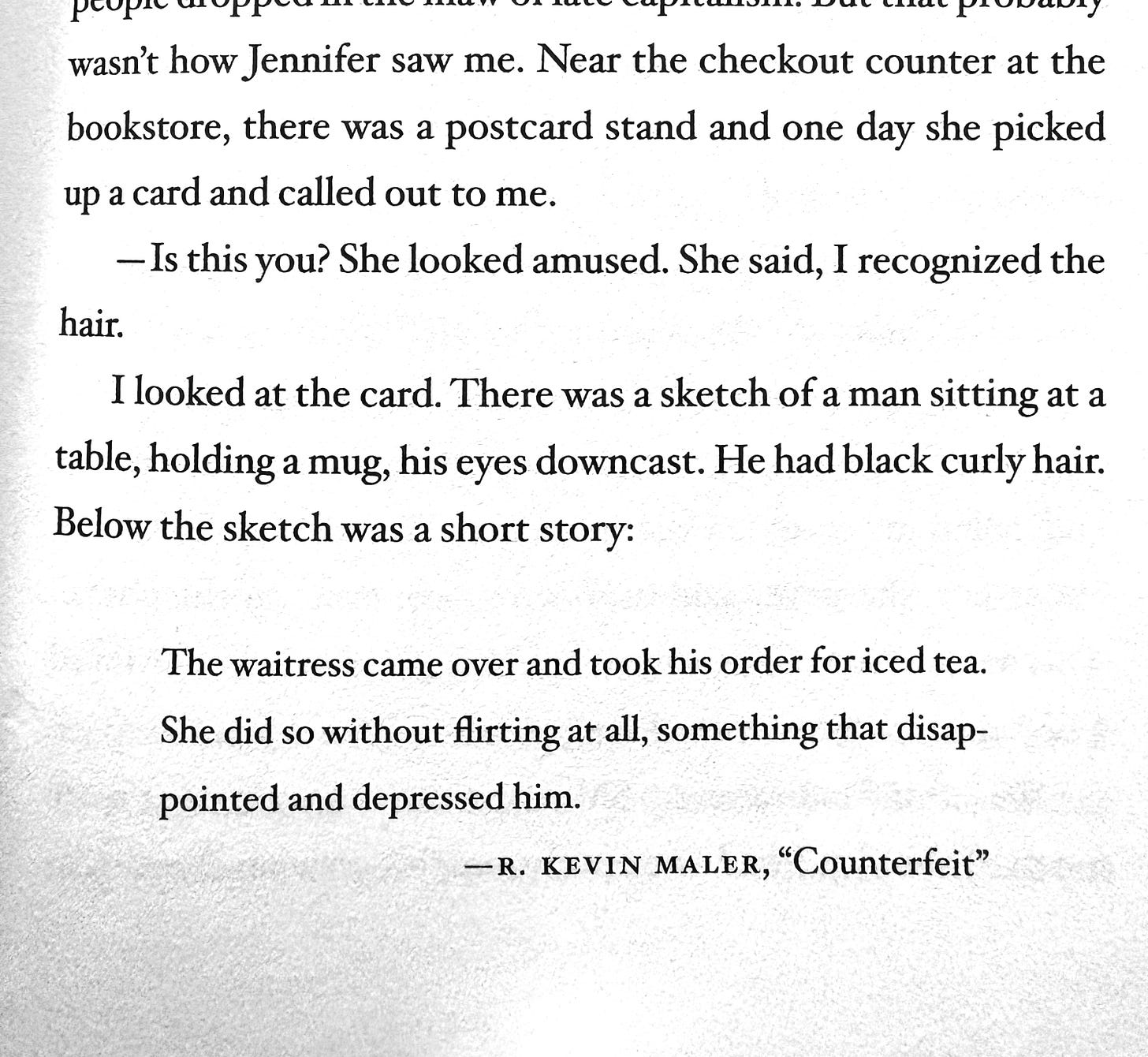
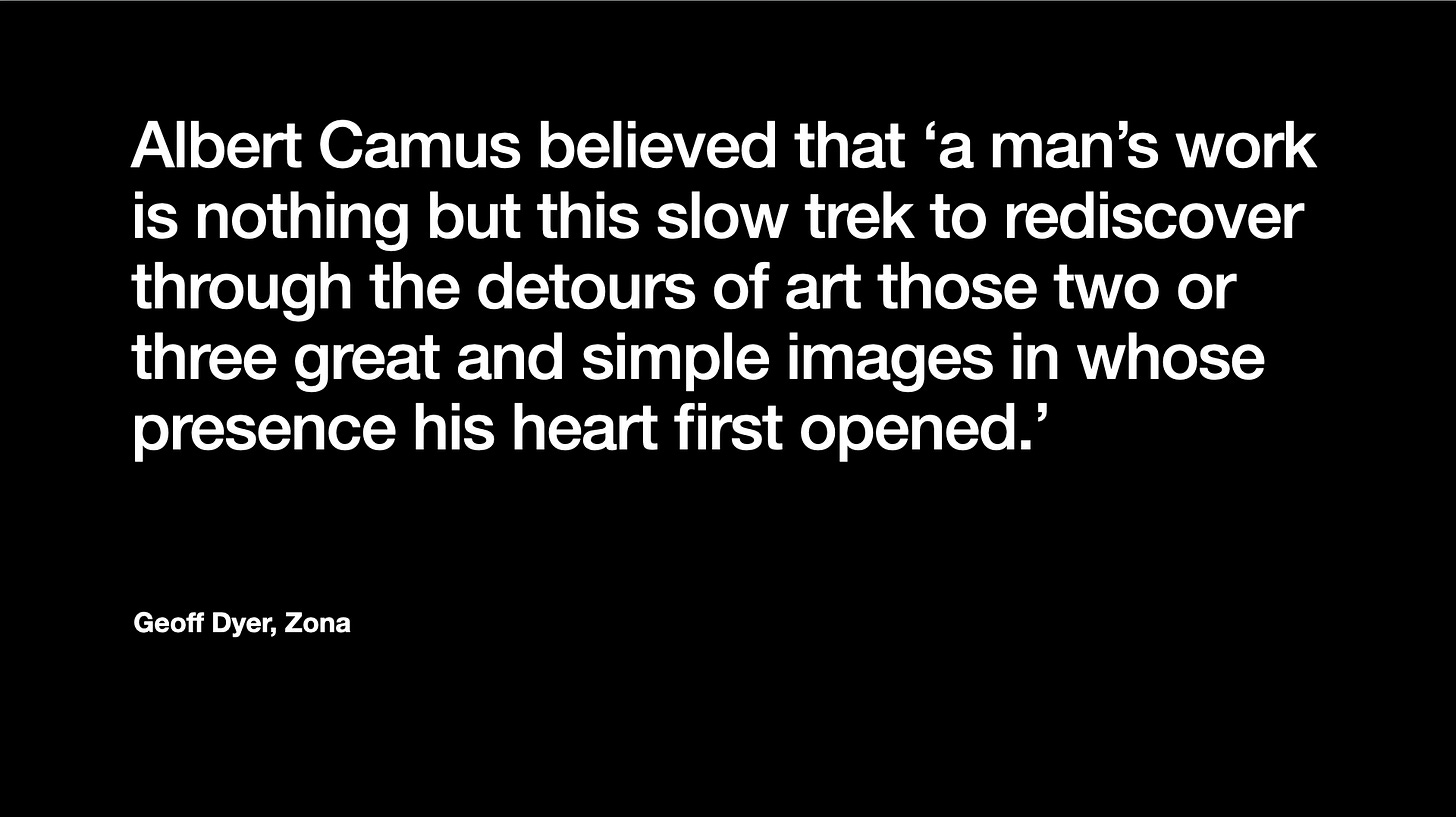
I love every word of this. It was pure delight to see you, Amitava. And afterwards, the name we couldn’t remember came back to me: Trish Wilson.
You take a perfectly good line and make it bad. I think it teaches us what makes a piece of writing good. I think this is a good exercise for any budding writer. I used the prompt and penned down a paragraph, it was a great moment for me.